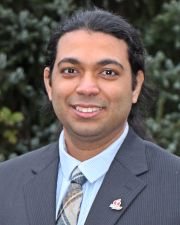
Venkat Keshav Chivukula, PhD
- Associate Professor, Advanced Heart Failure, Heart and Vascular Institute
- Adjunct Professor, McWilliams School of Biomedical Informatics
Biography
Venkat Keshav Chivukula, PhD, is an Associate Professor in the division of Advanced Cardiopulmonary Therapies and Transplantation at UTHealth Houston focusing on translational research. He is currently working on virtual surgery, AI-powered hemodynamic digital twins, medical imaging, health-related signal processing and medical devices using multiscale and multiphysics computational modeling of biomechanics, blood flow and heat transfer. He is experienced in patient-specific optimization, device-patient interaction, mechanical circulatory support and advanced heart failure. His interdisciplinary work is translational and spans cardiovascular and neurovascular diseases, such as LVAD therapy, heart failure, cerebral aneurysm treatment, stroke, organ transplantation and artificial kidneys.
He has a background in Mechanical and Biomedical engineering, with clinical postdoctoral experience. He obtained his BE in Mechanical Engineering from the University of Mumbai, India, MS in Mechanical Engineering from the University of Arizona and PhD in Biomedical Engineering from the University of Iowa. Following this, he was a post-doctoral researcher at the Oregon Health and Science University and the University of Washington.
Dr. Chivukula is a recipient of the Outstanding Teaching Faculty Award (University of North Texas), American Heart Association (AHA) Career Development Award and Faculty Excellence in Research Award (Florida Institute of Technology). His research has been funded by the American Heart Association (AHA), the American Society of Artificial Internal Organs (ASAIO), National Institutes of Health (NIH) and the medical device industry.
Beyond research, he is very passionate about teaching and enjoys empowering students in the fantastically intriguing realm of interdisciplinary engineering and science. Additionally, he enjoys K-12 outreach by spreading the power of knowledge (especially in STEM fields) to the youth of today. Outside of research and teaching, Dr. Chivukula enjoys soccer, cars, food and spending time with his family.
Education
- Postdoctoral
- University of Washington
- Postdoctoral
- Oregon Health and Science University
- Doctorate
- University of Iowa
- Masters
- University of Arizona
- Bachelors
- University of Mumbai, India
Areas of Interest
Clinical Interests
Virtual patient modeling, health digital twins, virtual surgery, artificial intelligence, computational fluid dynamics, hemodynamic optimization, data driven predictive modeling, patient and therapy risk assessment, patient-specific and patient-derived framework for quantifying and assessing hemodynamic phenomena for cardiovascular and cerebrovascular disease.
Publications
- Patient-specific Hemodynamic Modeling to Optimize LVAD Speed and Right Heart Health
- Investigating Cardiac Temperature During Heart Transplantation Using the Static Cold Storage Paradigm
- EXCOR membrane motion analyzer (EMMA) to quantify and assess hemodynamic performance of the EXCOR pediatric heart assist device
- Atrial fibrillation increases thrombogenicity of LVAD therapy
- Encouraging Regular Aortic Valve Opening for EVAHEART 2 LVAD Support Using Virtual Patient Hemodynamic Speed Modulation Analysis
- A Computational Hemodynamics Approach to Left Ventricular Assist Device (LVAD) Optimization Validated in a Large Patient Cohort
- Left Ventricular Assist Device Inflow Cannula Angle and Thrombosis Risk